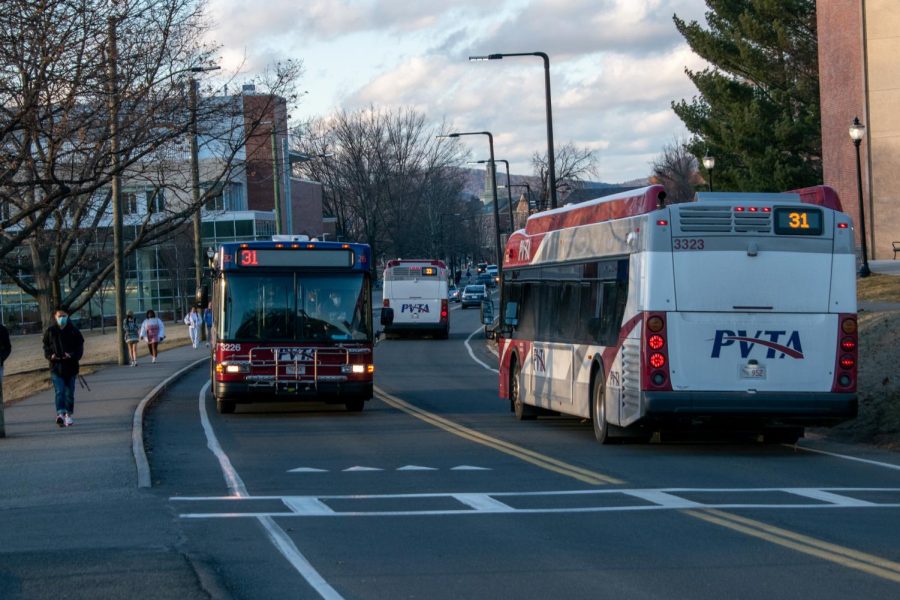The Five Colleges allowing their students to use the Pioneer Valley Transit Association (PVTA) buses for free is something a lot of us take for granted. Not only does it save us time by giving us an alternative to walking everywhere, but it also saves money for people who would otherwise have to pay for the gas they use driving. It sharply cuts down on campus traffic, an issue that would be unimaginably worse if everyone had to drive their own car. Giving students readily available public transportation wherever they go also drastically lowers carbon emissions, especially since a large portion of the buses are hybrid or fully electric. Additionally, it frees people from the responsibility of finding a designated driver.
This free bus system has been a resounding success since 1979, when the Five Colleges made a deal to partially fund the PVTA in exchange for its students having access to free transport. Why then, some might ask, wouldn’t it work for systems such as the Massachusetts Bay Transit Association (MBTA), which local politicians such as Mayor Michelle Wu, Sen. Ed Markey and Rep. Ayanna Pressley have floated the idea of making completely fare-free?
A few reasons.
First off, such a move would be a logistical nightmare. The PVTA is much smaller than the MBTA. The PVTA is largely made up of buses and vans and currently, it includes no rail system. Therefore, it can get by with funding from state, local and federal governments as well as annual payments from the Five College Consortium. It’s worth mentioning that even with these sources of funding, the PVTA has faced operating costs issues in recent years. There are simply much fewer factors and costs to consider in this case than with a transit authority with a sprawling subway and commuter rail system that extends to the far reaches of eastern Massachusetts, and even places such as Rhode Island and Worcester.
It’s also worth considering that the PVTA is not completely free for all its riders, as some proponents believe the MBTA should be. Five College students and staff don’t have to pay for ridership on routes such as the B43 and R29, but everyone else does. The Five Colleges and their students understandably don’t want to foot the bill of riders who don’t study or work there, and the PVTA certainly can’t afford to let non-students and non-staff ride for free. If the PVTA can’t afford it, then the MBTA surely cannot. Not even college students in the greater Boston area enjoy free MBTA ridership, most colleges such as Boston College and Boston University only offer a slightly discounted rate.
Last but certainly not least, fares are absolutely crucial to the MBTA. Revenue from fares make up a whopping 86 percent of the MBTA’s operating revenue. It’s not realistic for this system to handle such a drastic shift without making significant cuts to service. Just like public transit in NYC, San Francisco and Chicago, a large portion of fare revenue goes towards maintaining the MBTA’s infrastructure. This is especially true considering the colossal budget issues the MBTA is currently facing; according to the Mass Taxpayers Foundation, the MBTA will face a budget deficit of $200 million in fiscal year 2024.
Making the MBTA completely fare-free may sound like a good idea on paper, but implementation of such a policy would only increase the myriad issues it already faces. The last thing a sorely underfunded public transport system needs is the loss of its largest source of revenue. The last thing residents of the Greater Boston area need is the tax increase required to sustain such a radical move, especially with the cost of living as high as it currently is. The PVTA may be able to handle letting college students and staff ride for free, but a much larger transit authority giving up fares from everyone that steps foot on a bus or train? It would be a complete trainwreck.
Public transportation in America is known for being lackluster when compared to other first world countries, but making everything free is not the solution. State and local governments should focus on upgrading the infrastructure they already have, instilling a more reliable security presence and boosting the pay of workers such as train conductors and bus drivers. If we as Americans really want to redeem our public transport system, it needs more investment, not less.
Will Duffy can be reached at [email protected].




















James • Aug 11, 2022 at 1:59 pm
This piece doesn’t put the operating revenue into perspective when comparing it to overall funding. The operating revenue is the money the mbta makes just through operation of their vehicles, without taking into consideration any other revenue they get from taxes, local assessments, etc. This 86% is misleading to those who don’t know more about public transportation funding. Fares actually only made up for 33% of the MBTA’s total revenue in 2019, the year you are referencing.
Lisa • Mar 30, 2022 at 9:48 am
The PVTA is free for students because it is built into tuition.
David • Mar 29, 2022 at 12:31 pm
“Free” is not free when it’s an allocated cost paid for by tuition and fees.